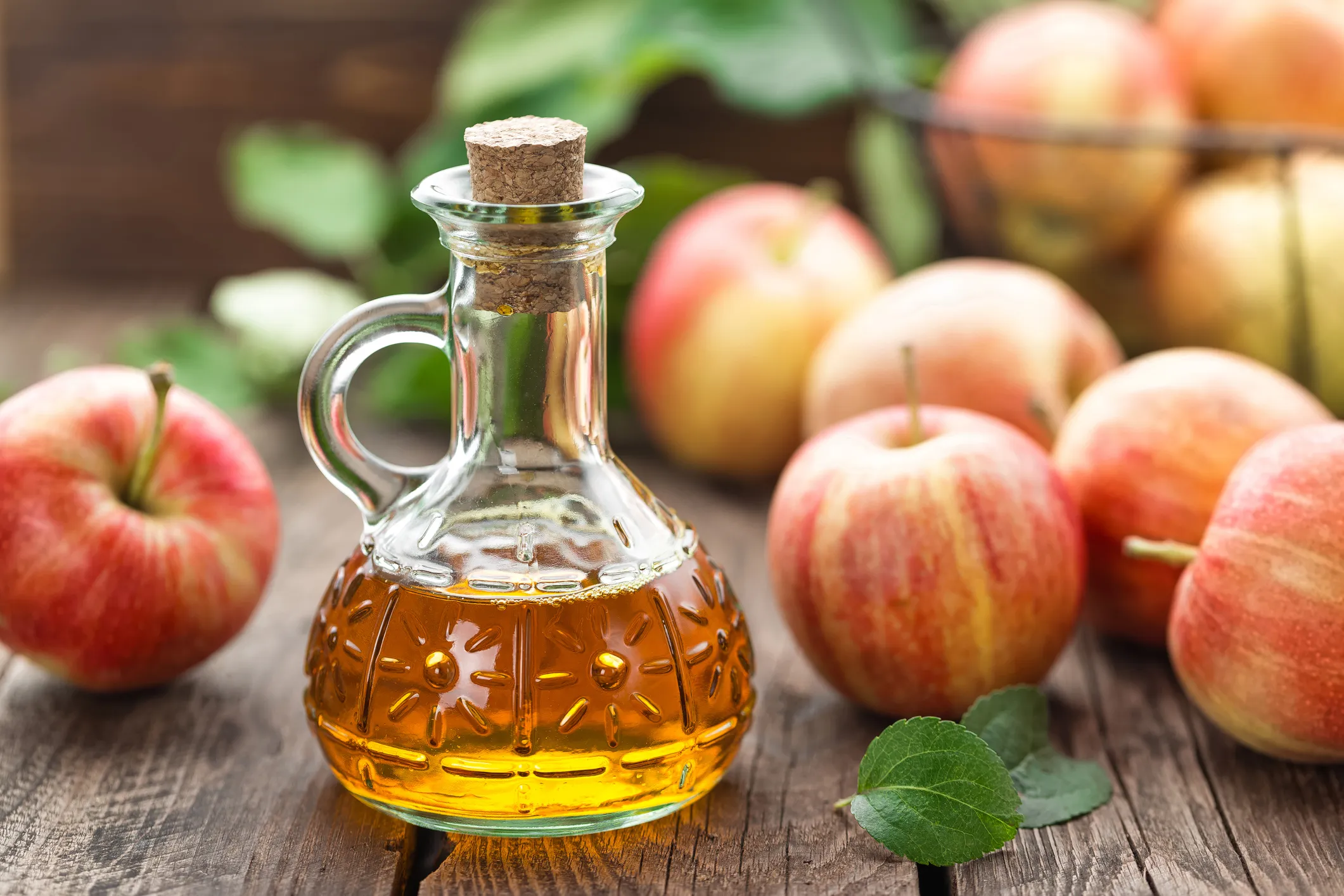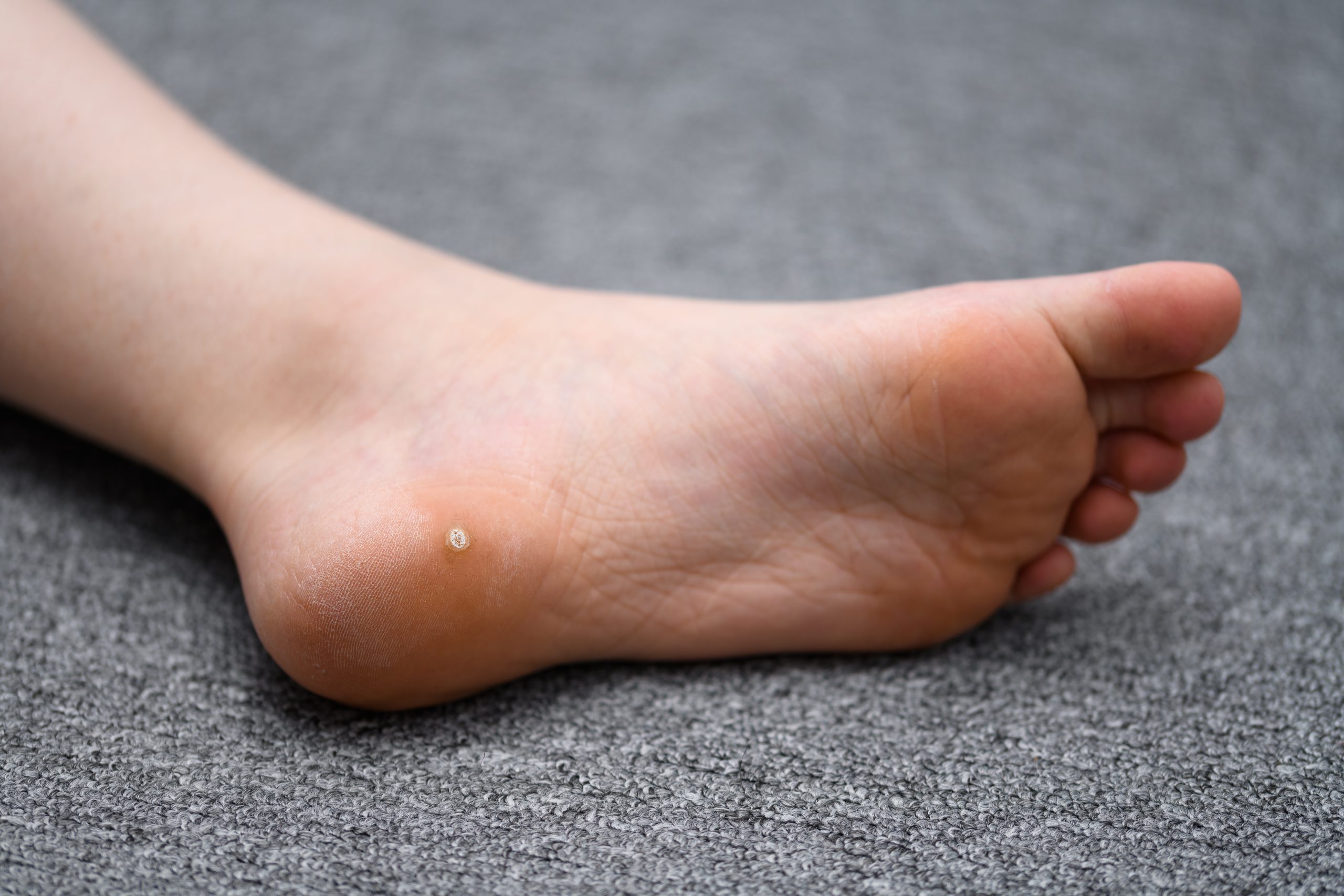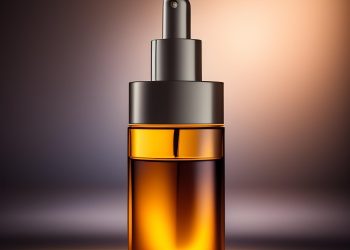Apple cider vinegar has long been a home remedy since the days of Hippocrates, a Greek physician (460–377 BC), traditionally regarded as the father of medicine.[1]
Did you know the ancient Greek doctor treated wounds with it?
In recent years, people have been using apple cider vinegar for skin problems, to lose weight, to improve heart health, and even to treat Dandruff.[1]
Some studies have found that acetic acid in apple cider vinegar, which gives vinegar its distinctive taste and smell, makes it a useful remedy.
Continue reading to learn:
- What is apple cider vinegar, and what are its properties?
- The benefits of apple cider vinegar for a healthy skin
RELATED: Apple Cider Vinegar for UTI Treatment: 10 Practical Ways
Apple Cider Vinegar and Its Properties
Apple cider vinegar is made through a process known as fermentation, in which active yeast is combined with sugar to form alcohol.[2]
For apple cider vinegar, the naturally occurring sugar from crushed apples is combined with the yeast to turn the fruit sugar into alcohol. [3]
During the process, the yeast consumes sugar and uses it to grow healthy bacteria. Bacteria then turn the alcohol into acetic acid.
That gives vinegar its sour taste and strong smell and is mainly responsible for the beneficial compound in apple cider vinegar.
To make the best apple cider vinegar for therapeutic and health, certified organic apples should be used.
Even pasteurization is not required, especially for people using it for health benefits, as it kills all delicate nutrients and enzymes.
The acidity of the vinegar is enough to prevent unhealthy bacteria from developing.
Remember that not all apple cider vinegar is created in the same way!
To maximize the benefits of using Apple cider vinegar, try to ensure that you buy it raw and with the “mother” intact; this means that it still contains the beneficial compounds, including the probiotics.
A good tip for finding the right one is to look for cloudy vinegar, as this sign that the friendly enzymes and bacteria that promote healing have not been removed.
The cloudy strands are referred to as the “mother” probiotics.[1]
With such beneficial properties, it is needless to mention that it has many benefits and uses. However, in this article, you will learn how apple cider vinegar can benefit your skin.
So that you can incorporate apple cider vinegar into your daily skincare regime and solve some skin problems without spending a fortune.
10 Ways Apple Cider Vinegar Benefits Your Skin
1. Drinking Apple Cider Vinegar Helps Reduce the Visible Signs of Aging
Besides the wisdom and experience gained by becoming older, most of us do not look forward to the physical signs of aging, such as wrinkles and sagging skin.
But aging is a natural process, and nothing can be done to stop it. However, regular care can reduce the signs of aging that take a toll on our skin.
One of the key ingredients that can aid in the process is antioxidants. [4]
Thankfully, antioxidants are abundant in apple cider vinegar, help prevent premature aging, and aid in slowing down the aging process.[6]
Moreover, Apple cider vinegar’s ability to maintain the stability of the acid/alkaline balance in the body also plays a significant role.
RELATED: Coconut Oil for Wrinkles: 20 Effective Home Remedies
2. Apple Cider Vinegar Assists in the Fight Against Free Radical Damage
You’ve probably heard the term “free radicals,” especially with so many TV commercials talking about it, but do you know what it means?
According to the technical definition, it is a molecule or atom with an unpaired electron in its outer orbit. [5]
Free radicals are continually created to continue the body’s metabolic activity and are essential to life.
As they fight infection by killing various germs that can cause us infections, the problem arises when there is an overproduction of free radicals, which can cause all sorts of trouble.
Suppose there are more free radicals that enzymes or antioxidant nutrients can handle. In that case, it might result in oxidative damage to cell membranes, tissues, proteins, and even DNA, leading to ulcers, emphysema, arthritis, and immune disorders.[5]
Just about every disease you can think of is due to free radicals.
And the damage done is not limited to our inner body; it affects our outer appearance as well, resulting in wrinkles and a more worn look.
Avoiding free radicals completely is practically impossible; we can minimize our exposure and neutralize their effects by eating more antioxidants that halt free radicals from causing extensive damage.[6]
As mentioned earlier, apple cider vinegar has plenty of antioxidants, which can help to fight against free radical damage.
3. Apple Cider Vinegar can Relieve the Pain of a Sunburn and the Itch of a Bug Bite
Apple cider vinegar is highly effective in soothing sunburn, so if you ever find yourself with sun burnt skin try using apple cider vinegar. [7]
It helps promote healing, prevent blistering, relieve pain and decrease redness.
All you have to do is add 1 cup of apple cider vinegar in a lukewarm water bath and ¼ cup of coconut oil and lavender essential oil to ease sunburnt skin.
Or combine a half cup of Apple cider vinegar with four cups of water and then dip a clean washcloth in the mixture and apply it to the affected areas.
The same method can be used for bug bite itching. If you have a lot of bites, just put two cups of apple cider vinegar in a full tub of water and soak. It will help with itching.
RELATED: 11 Reasons to Use Coconut Oil for Sunburn
4. Apple Cider Vinegar Helps to Get Rid of Warts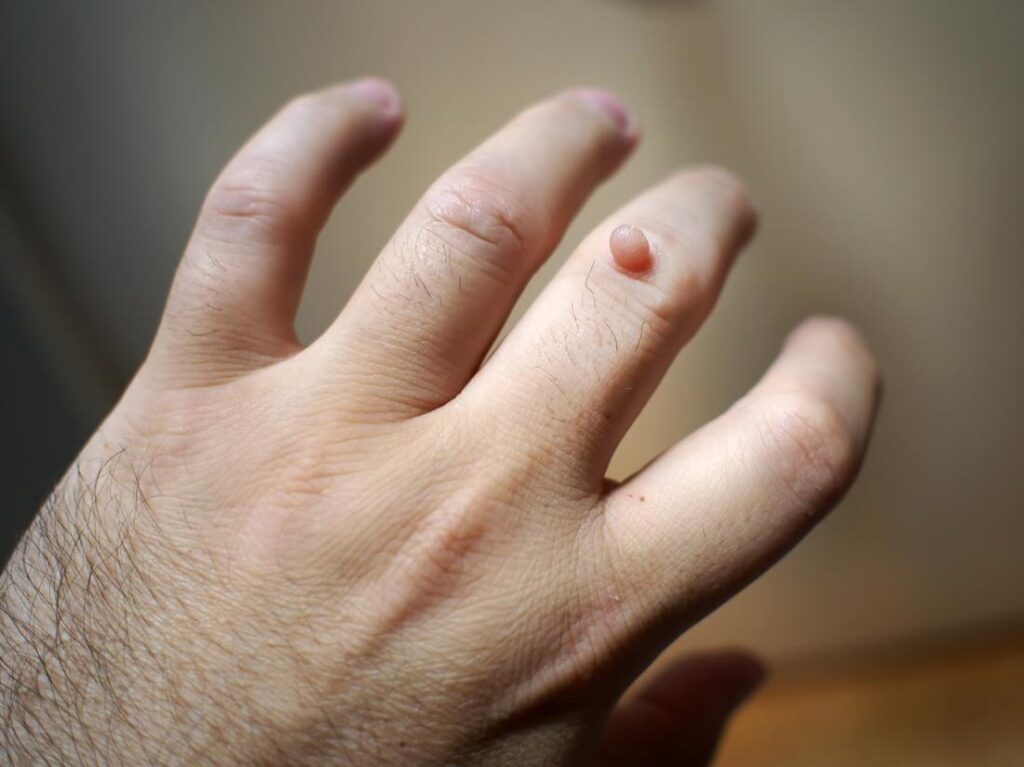
Apple cider vinegar can help to get rid of warts too. Though it does not kill the virus that causes it, it is effective because it is high in acidity.
This acidity can attack the flesh that makes up warts killing it so it can naturally peel away from the skin.
It also helps to prevent a recurrence since the virus-affected skin is gone.
All you need is two tablespoons of Apple cider vinegar, some cotton balls, and a bandage.
Soak a cotton ball in the apple cider vinegar, gently squeeze out the excess liquid, apply it to the wart, and cover it with a bandage.
Leave it overnight and take it off in the morning. Repeat this procedure every day; it should die and come off within a couple of weeks.
RELATED: How to Get Rid of Warts: 8 Essential Oil Remedies with Directions!
5. Apple Cider Vinegar can Work as a Great Toner
Apple cider vinegar makes a great natural toner that can be a highly effective natural home remedy for acne and acne-prone skin.
The malic and lactic acids in apple cider vinegar contain antiviral, antifungal, and anti-bacterial properties that keep the skin clean, balanced, and free from acne while encouraging it to heal.
These components also aid in softening and gently exfoliating the skin, reducing red spots and active acne.
Additionally, apple cider vinegar helps maintain your skin’s pH level
You can get healthy skin by regularly using apple cider vinegar as a toner.
All you have to do is mix apple cider vinegar with equal parts of water and use it as your regular toner.
You can also dab this mixture on active acne or use it as a wash and then put some coconut oil and your favorite essential oil on that area to support further healing.
So, before you cut your pocket on a pricey toner that probably contains multiple toxic compounds, try creating this mixture.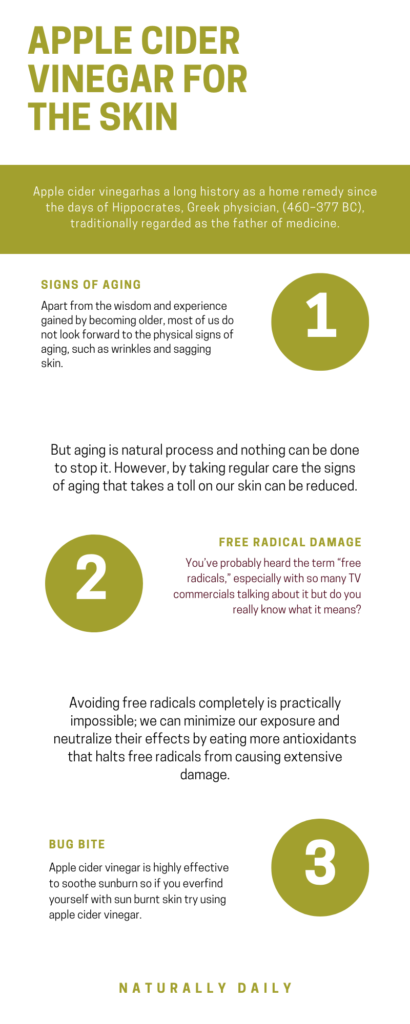
6. Apple Cider Vinegar can Fade Age Spots
Most creams and lotions designed to fade age spots contain alpha-hydroxy acid, a substance well known for its spot reduction ability. However, they usually also come with a high price tag.
But fortunately, you can easily replace them with inexpensive apple cider vinegar.
Apple cider vinegar also contains alpha-hydroxy acid, which helps the skin stay firm while fading and renewing.
Combine an equal amount of water and apple cider vinegar. Dip a cotton ball or pad into the mixture and then place it on the age spots for a few minutes, allowing it to soak in.
If it does not cause any reaction on the skin, then leave it on longer (10 to 15 minutes), and then rinse.
7. Apple Cider Vinegar can Fight Seasonal Allergies
Apple cider vinegar is an amazing treatment for seasonal allergies.
It helps to break up the mucous in your body and supports lymphatic drainage.
It also supports the immune system and can clear your sinuses.
Just put 2 tablespoons of apple cider vinegar in a large glass of water and drink three times daily for allergies.
8. Apple Cider Vinegar can Cure Fungal Infection on Toenails and Skin
The antibacterial and antifungal compounds in apple cider vinegar make it a great natural remedy for skin and toenail fungus.
Just rub on the area of fungus two times daily. A mixture of coconut oil and oil of oregano is great for killing fungus.
It can also treat infection under the cuticles. But, first, you must mix one-fourth cup of vinegar with a three-fourths cup of water and soak your nails into the solution.
You can see a difference after doing this a couple of times.
RELATED: 21 Home Remedies for Foot Fungus, Nail Fungus & Athlete’s Foot
9. Apple Cider Vinegar Aids to Ease Varicose Veins
Apple cider vinegar works wonders for varicose veins because it improves circulation in the vein walls and is anti-inflammatory, reducing bulging of veins.
To treat this condition, you must combine apple cider vinegar with witch hazel and rub on veins in a circular motion.
Improvements can be seen in around two weeks.
10. Apple Cider Vinegar can Treat Dandruff
Apple cider vinegar can help with Dandruff as well.
Due to its acidity, it can increase the sloughing of the skin on the scalp.
Also, its antifungal properties can help remove the existing Dandruff and prevent such situations from occurring again.
Recommendations Before You Get Your Bottle of Apple Cider Vinegar and Start Using It!
Many people who consume apple cider vinegar do not care for the taste.
But if you are new and you hate how it tastes, do not discontinue it altogether as you can make it taste better. And here are some ways in which you can do so-
Add raw honey. Combining apple cider vinegar with raw honey and a splash of water is easy to make swallowing the bitterness much more tolerable.
Try combining two cups of water, two to three teaspoons of ACV, and one tablespoon of raw honey.
Combine it with juice for a tasty tonic. For example, mix a couple of teaspoons of Apple cider vinegar with apple or grape juice. This will not only make things bearable, but you’ll also actually enjoy drinking it.
Make a tea. Apple cider vinegar tastes great as tea. To prepare, combine a cup of water, a dash of cinnamon, a teaspoon of raw honey, and two teaspoons of apple cider vinegar in a pot on the stove.
Bring the mixture to a boil, allow it to cool enough, so it’s drinkable, and enjoy.
Bottom Line
Not all apple cider vinegar has the same strength. It varies from brand to brand and even among batches within a brand.
It has different concentration levels of acidity too.
If you decide to use apple cider vinegar, try to buy from a renowned brand that clearly labels the acidity level.
And whatever you do, don’t use it full-strength.
Also remember that you should never drink apple cider vinegar as it can burn your esophagus.
Instead, mix one or two tablespoons in a big glass of water.
Using apple cider vinegar is the best way to tackle and prevent many skin-related problems.
So next time you go grocery shopping, remember to put a bottle of apple cider vinegar into your cart!
READ NEXT: 20 Reasons to Use Apple Cider Vinegar for Hair + How to Use it
